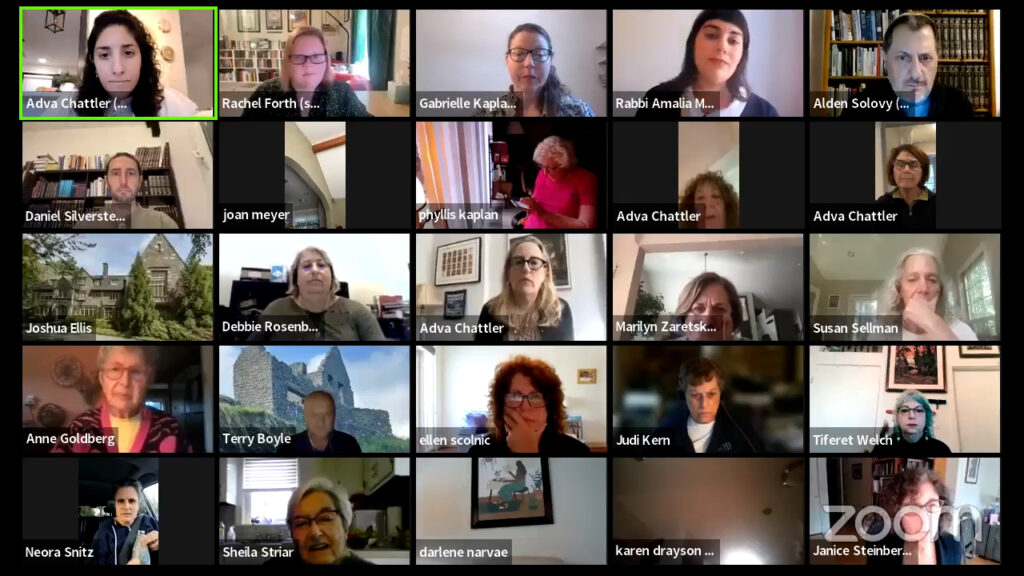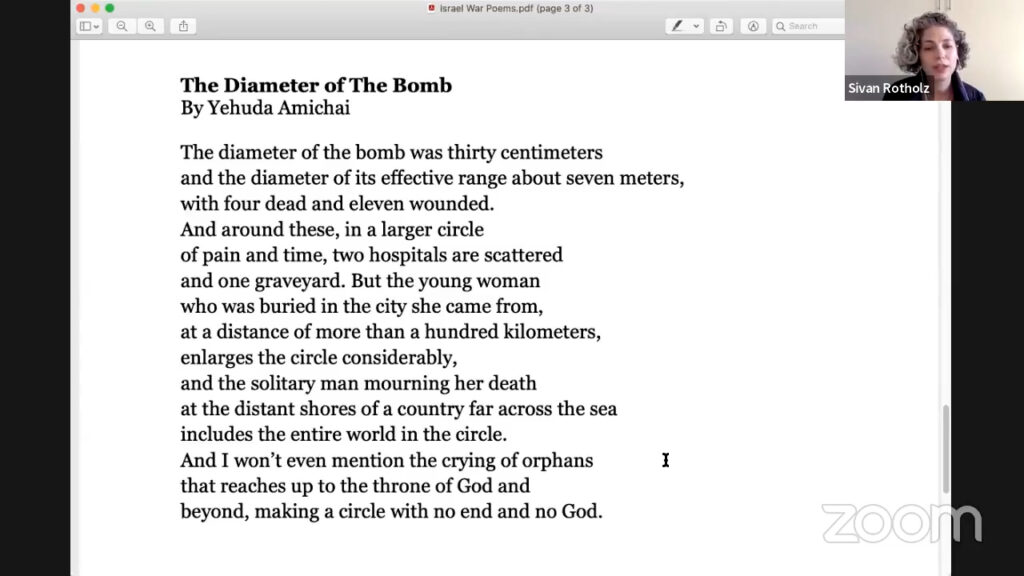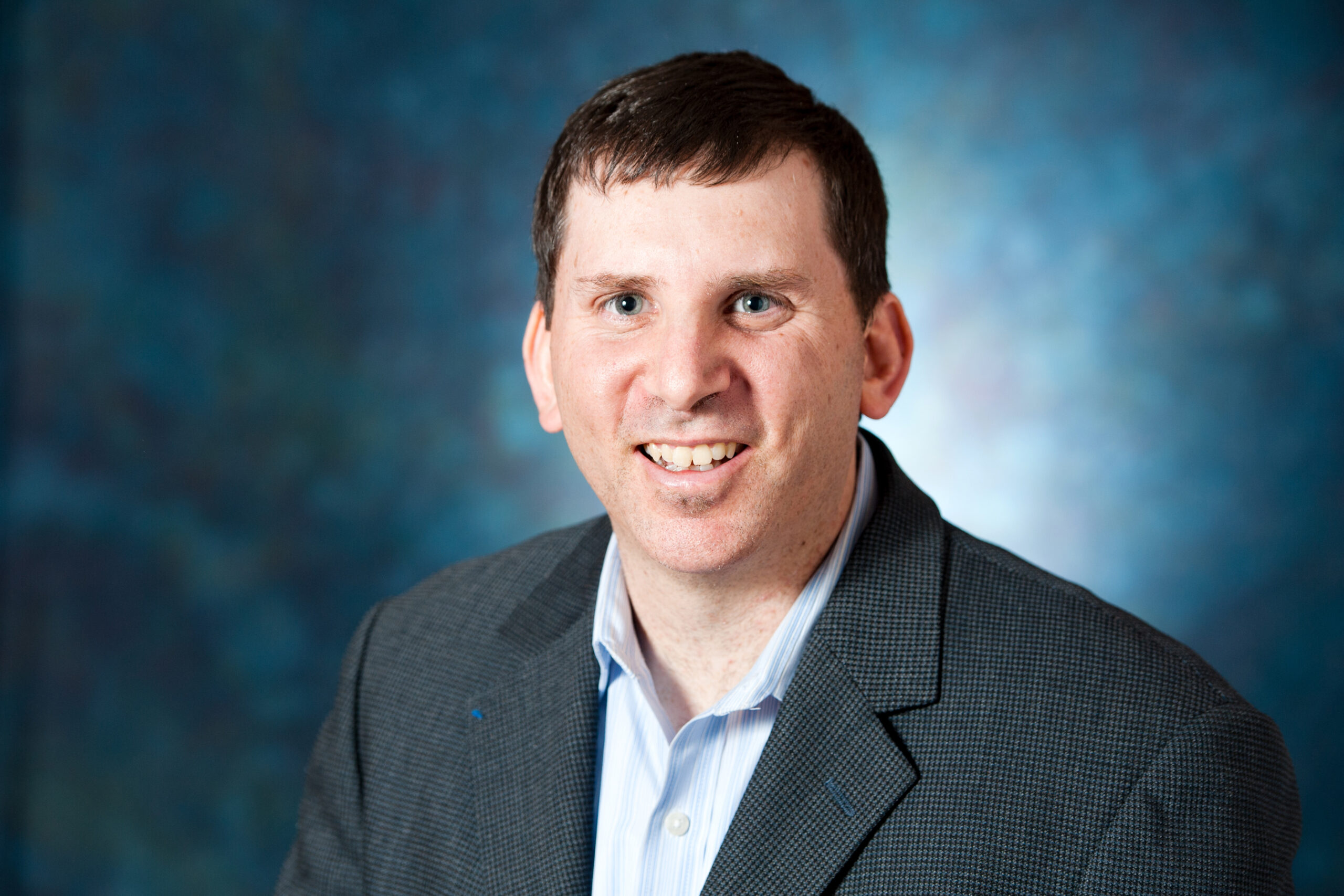Heartbroken.
Angry.
Fearful.
Empty.
Connected.
Those were some of the emotions expressed via chat during “Holding Israel on Our Hearts” a virtual program held Oct. 11. The event — co-sponsored by Ritualwell and Mayyim Hayyim, — brought together some 200 people from the world, including several in Israel. It came five days after the deadliest day in Israel’s history — with the death toll passing 1200 and the full scope and gruesomeness of the Hamas attack still sinking. People gathered as hostilities along Israel’s northern and southern fronts intensified, with the prospect of a protracted ground war on the horizon.
For 45 minutes, participants had a digital space to be together and hold their intense, conflicting emotions. Presenters recited poems — both their own work, composed in the past days, and the work of other poets — led meditations and recited prayers, such as the Mi Sheberach, a prayer for healing, and the Kaddish, the memorial prayer for the dead. (Here is a link to all the resources recited during the program.)
I wrote this prayer thinking every moment about the babies, the children, the women, the grandparents, all the people right now that are held captive.
Adva Chattler
One scheduled speaker, Rabbi Haviva Ner David, was unable to appear on camera. Like many in Israel’s north, she’d taken refuge in a bomb shelter, after what turned out to be a false alarm. (Adva Chattler, Reconstructing Judaism’s managing director of engagement and innovation, read “Interfaith Prayer for Comfort, Hope and Peace” in Ner-David’s stead.)
Gabrielle Kaplan-Mayer, Ritualwell’s new director of virtual content and programs, said that, as the week began, the Ritualwell team members realized people’s need “for a space to bring their emotion, their grief and sadness. Ritualwell is a place where people can find community and feel their emotions and support each other.”

“We were surprised to see how many people attended,” she continued. “It shows the power of the Ritualwell community and the need for a space to hold all of the big emotional and spiritual questions that have been swirling.”
A number of attendees on Zoom and Facebook expressed appreciation. One participant Margaret Sequeira, commented on Facebook live, “Thank you for creating this space for us to be together. There is so much comfort in being together.”
Ritualwell has received a flood of submissions and has been posting them at a frantic pace (read them here.) On Friday, Oct. 13 at 12 p.m. Chattler hosted another event called “Braided Together: Taking Challah Ritual for Israel.”
During the program, Chattler conveyed the deepest emotions in her voice — heartbreak, fury, love — as she read her new poem, “Bring Them Home,” about the 150 people taken captive by Hamas.
“I wrote this prayer thinking every moment about the babies, the children, the women, the grandparents, all the people right now that are held captive,” said Chatter as she introduced her poem., Chattler grew up in Israel’s Negev region and now lives half a world away in Texas.
Speaking from Jerusalem, poet and liturgist Alden Solovy read a cycle of three poems composed in the days after Oct. 7, tracing a wave of feelings from sorrow to fear to anger.

“My own tears have been flowing. Because I don’t have my own children who have been called up, I feel a bit like an imposter, even though I have been running to shelters and going to funerals and shivas and packing boxes for soldiers. We all have a right to our own grief and our own experience,” he said before reciting his work. “Be with us. Every message you send, to anyone here, is balm for the heart, and the soul. Stay connected with us please.”
Also speaking from Israel, Rabbi Daniel Silverstein echoed those sentiments at the conclusion of a mindfulness mediation. “As we go forward in the hours and days, let’s keep being compassionate with ourselves,” said Silverstein. “Know that you are with us here. We feel it very very strongly. It means everything to us.”
“One of the things I have been struggling with is, ‘how can God let this happen? Where is God in moments like this?”
Sivan Rothholtz
Jewish educator Sivan Rothholtz read several works by poets who experienced war in Israel firsthand, including two by the late Yedudah Amicahi, perhaps Israel’s most celebrated poet after Hayim Nachman Bialik.
“One of the things I have been struggling with is, ‘how can God let this happen? Where is God in moments like this?” said Rothholtz. “What I landed on is the concept of God as the shekhinah, as God in exile with us and suffering with us. And just as we need to find compassion for one another, we also need to find compassion for God. Perhaps it is aleinu on us to bring peace.
“This tension of being angry with God and not understanding why these things happen in the world is something that resonated with me and something the poets speak to.”
Look to Ritualwell in the coming days for more resources and events.








